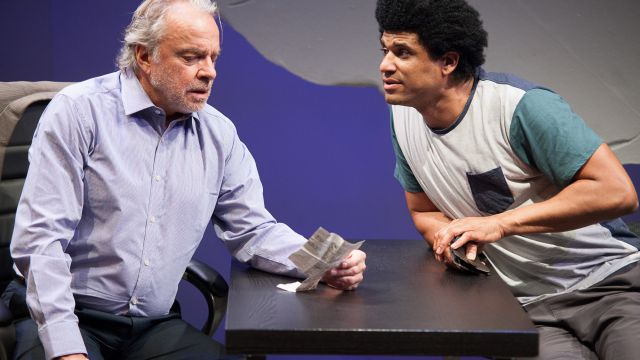Blue/Orange
Considering that this play takes a sardonic look at race, mental illness, ambition and the inadequacies of medical systems, you might expect it to be fairly heavy, which in parts it is – but it is laced with wit and humour that skillfully diffuses the otherwise seriousness of the themes.
On a minimalist set overhung by a cloud-like backdrop with a sculptured sphere sometimes orange, sometimes blue, Anna Crawford’s direction has allowed the play to speak for itself, concentrating on the strength and depth of the characters and the three-way tug-of-war that lays bare their frailties – and their ability to manipulate and deceive.
Christopher (Dorian Nkono) is the patient, suffering, it seems, from schizophrenia and delusions (he believes he is the son of Idi Amin), and due to be released from hospital. Drug and caffeine deprived in hospital, he is jumpy and on edge and Nkono depicts this with an intensity that is convincingly real. He is really inside the character, eyes burning, knee shaking, simmeringly subdued one moment, bouncing, pacing, angry, confused the next. Yet there is an almost animal cunning in the way he takes in the jargon-filled suggestions of the medicos.
 Bruce (Ian Meadows) is the young psychology intern, who, not convinced his patient is ready to be released, has called for the advice of his supervisor. Meadows depicts the underlying pressures of the archetypical young probationary doctor with great clarity: real concern for his patient and anxiety about his diagnosis, juxtaposed with the need to conform and impress in order to gain permanency. All are evident in Meadows’ tighter and tighter efforts at control.
Bruce (Ian Meadows) is the young psychology intern, who, not convinced his patient is ready to be released, has called for the advice of his supervisor. Meadows depicts the underlying pressures of the archetypical young probationary doctor with great clarity: real concern for his patient and anxiety about his diagnosis, juxtaposed with the need to conform and impress in order to gain permanency. All are evident in Meadows’ tighter and tighter efforts at control.
Robert (Sean Taylor) is the ambitious supervising Consultant, who appears to be more concerned about the availability of beds than the welfare of a patient. Taylor is convincingly nauseous in this role, and though he has some long and demanding dialogue in the first act, he sustains the sneering, supercilious arrogance of the character with consummate ease.
Penhall’s dialogue mixes Brixton-style street talk and complicated clinical jargon in a carefully constructed comment on delusion – especially self-delusion! The characters and the messages they convey are tellingly real, albeit probably laboured for a little too long in the first act. However, Crawford and her cast successfully push the pace just fast enough to overcome this, without losing the caustic humour or the hurtful effects of intellect and ambition over compassion and commonsense.
Carol Wimmer
Images: Sean Taylor and Dorian Nkono & Sean Taylor, Ian Meadows and Dorian Nkono. Photographer: Clare Hawley.
Subscribe to our E-Newsletter, buy our latest print edition or find a Performing Arts book at Book Nook.

